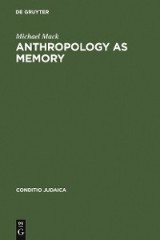Details

Anthropology as Memory
Elias Canetti's and Franz Baermann Steiner's Responses to the ShoahISSN, Band 34 1. Aufl.
|
CHF 104.20 |
|
| Verlag: | De Gruyter |
| Format: | |
| Veröffentl.: | 20.04.2011 |
| ISBN/EAN: | 9783110965964 |
| Sprache: | englisch |
| Anzahl Seiten: | 236 |
DRM-geschütztes eBook, Sie benötigen z.B. Adobe Digital Editions und eine Adobe ID zum Lesen.
Beschreibungen
<p> This essay is offered particularly as a contribution to the relationship between theological and literary writings on the Holocaust. Franz Baermann Steiner’s (1909–1952) detailed sociological work – he taught at the Department of Social Anthropology at Oxford and developed a sociology of danger that strongly influenced Mary Douglas, T. W. Adorno, Iris Murdoch, H.G. Adler and Julia Kristeva – contrasts with Canetti’s emphasis on shock. Canetti’s response to the Holocaust constitutes, in Dominick LaCapra’s terms, an ‘acting out’ of trauma: a comparison between Canetti’s »Masse und Macht« and the anthropological texts he uses brings to the fore his bleak depicton of humanity.</p>
<p>By contrast, Steiner – in comparison to Canetti – lays emphasis on ‘working through’ the Holocaust, that is to say, on overcoming the paralysis of trauma by reflecting critically on values that might transform a damaged society. However, Canetti’s depiction of humanity cannot entirely be seen in LaCapra’s notion of ‘acting out’: for through the shock of ‘acting out’, Canetti nonetheless wants to bring about a ‘working through’. Similarly, despite the ‘working through’ shock and trauma are dramatized in Steiner’s poetry and his aphoristic writings. Morever, Canetti thematizes an ethical impact on his readership in his aphorisms. In response to the Holocaust both writers advance a theory of power: what Steiner calls danger, Canetti attacks as death. Steiner’s and Canetti’s respective responses to the Holocaust consists in a critique of static ways of thought, affirming ‘metamorphosis’, and deconceptualized understanding of the world which connects linguistic fluidity to the everchanging contextualities of social and embodied life.</p>
<p>By contrast, Steiner – in comparison to Canetti – lays emphasis on ‘working through’ the Holocaust, that is to say, on overcoming the paralysis of trauma by reflecting critically on values that might transform a damaged society. However, Canetti’s depiction of humanity cannot entirely be seen in LaCapra’s notion of ‘acting out’: for through the shock of ‘acting out’, Canetti nonetheless wants to bring about a ‘working through’. Similarly, despite the ‘working through’ shock and trauma are dramatized in Steiner’s poetry and his aphoristic writings. Morever, Canetti thematizes an ethical impact on his readership in his aphorisms. In response to the Holocaust both writers advance a theory of power: what Steiner calls danger, Canetti attacks as death. Steiner’s and Canetti’s respective responses to the Holocaust consists in a critique of static ways of thought, affirming ‘metamorphosis’, and deconceptualized understanding of the world which connects linguistic fluidity to the everchanging contextualities of social and embodied life.</p>
Diese Produkte könnten Sie auch interessieren:

The Empress and the English Doctor: How Catherine the Great defied a deadly virus

von: Lucy Ward

CHF 5.50

















